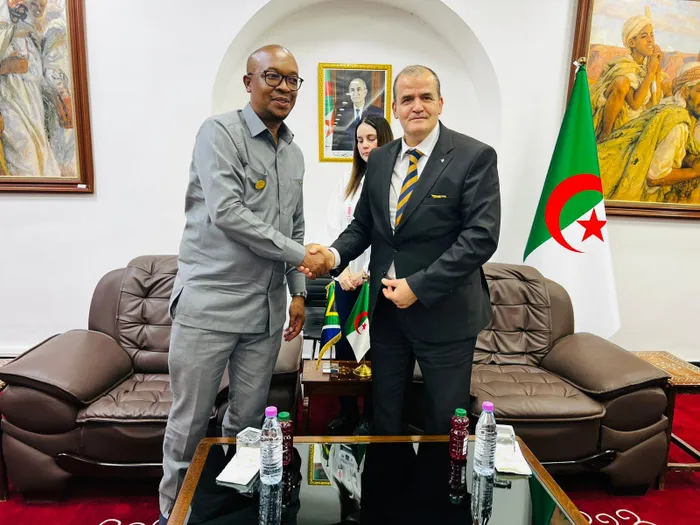Government alarmed by wave of mass retrenchments amid economic challenges
ECONOMY

Minister of Trae, Industry and Competition, Parks Tau, met with the Algerian Minister of Foreign Trade and Export Promotion, Kamal Rezig, in Algiers over the weekend. The meeting discussed the implementation of the MoU on economic cooperation, and agreed on the establishment of trade routes to improve bilateral trade.
Image: Supplied
The government has expressed deep concern over the implications of mass job cuts on the economy following retrenchment notices by a number of multinational corporations.
Last week, Glencore Operations South Africa revealed its intention to retrench employees at its Rustenburg ferrochrome smelter and vanadium operations, citing insufficient electricity supply and a general “lack of sustainable industry solutions.”
Companies who are considered intensive energy users have already sounded the alarm that the escalating costs of electricity could exacerbate job losses.
Similarly, ArcelorMittal South Africa announced preparations to close its long steel mills resulting in the loss of over 4 000 jobs, attributing its plight to delays in addressing structural problems that have plagued the firm and broader industry.
Ford South Africa also joined the ranks, notifying of impending job losses for more than 470 employees at its Silverton vehicle factory and Struandale engine factory, driven by a need to realign production capacities with fluctuating market demands.
This wave of layoffs sweeping through the country and impacting thousands of employees comes as 140 000 jobs were lost in the three months to June, raising the official unemployment rate by 0.3 of a percentage point from 32.9% to 33.2%.
Minister of Trade, Industry and Competition, Parks Tau, on Saturday said the government was working with captains of affected companies for a long-lasting solution to these problems.
“We are concerned about the announcements by a number of firms. These decisions are as a result of both domestic and international pressures including the changing trading environment and global restructuring of firms,” Tau said.
“We are engaging these firms and will work together with them to find solutions together.”
These companies are exporters of various products, and they also find themselves facing hefty tariffs when they ship their products to the United States market after the Trump administration imposed a 30% levy.
Tau on Saturday reiterated that the government had submitted a revised trade offer to the US government and that a team of negotiators was in Washington D.C. to engage with them.
“We have a senior delegation in Washington that is engaging counterparts in the US and will update the country in due course on progress with the US,” he said.
Tau was speaking on the sidelines of the Intra-Africa Trade Fair 2025 (IATF2025) taking place in Algeria. The IATF aims to increase intra-African trade and showcase the investment opportunities across the continent - which currently linger around 16% - and it is projected to translate into over $44 billion in trade and investment deals.
Tau said South Africa had set its sights on leveraging critical minerals for the future and emphasised that building regional value chains marks a pivotal moment in economic development.
“We are moving towards a path of growth and utilizing industrial instruments, further deepening our regional integration. This includes both SACU and SADC,” he said.
“We are exploring a number of tools including building regional value chains around our critical minerals linked to the battery value chain and other ideas such as cross border SEZs, which create ecosystems for shared prosperity. This we believe will boost regional growth and development.”
Speaking during the Auto Forum at the IATF2025 on Saturday, Stellantis South Africa CEO, Mike Whitfield, said automotive’s Original Equipment Manufacturers (OEMs) see Africa as the last real frontier and a lot can be learned from the role that South Africa has played in developing the industry.
“Manufacturers are looking for a level playing field, clear legislative environment, incentives and protection for investors and penalties for those who break those laws. Without that in place, it's very difficult for a multinational to make an investment in an industry with very capital intensities,” Whitfield said.
“There needs to be partnership, there needs to be mutual respect and work between government, industry and labour. And if we look back on the South African auto industry, it's an incredible example of public-private partnership. And that agreement for over 60 years between governments, OEMs and labour has resulted in an industry that directly employs 115 000 people.”
South Africa produces more than 54% of the approximately 1.1 million new vehicle total production in Africa every year, and the implementation of the African Continental Free Trade Agreement could deepen the country’s dominance and contribution to value-chain.
BUSINESS REPORT